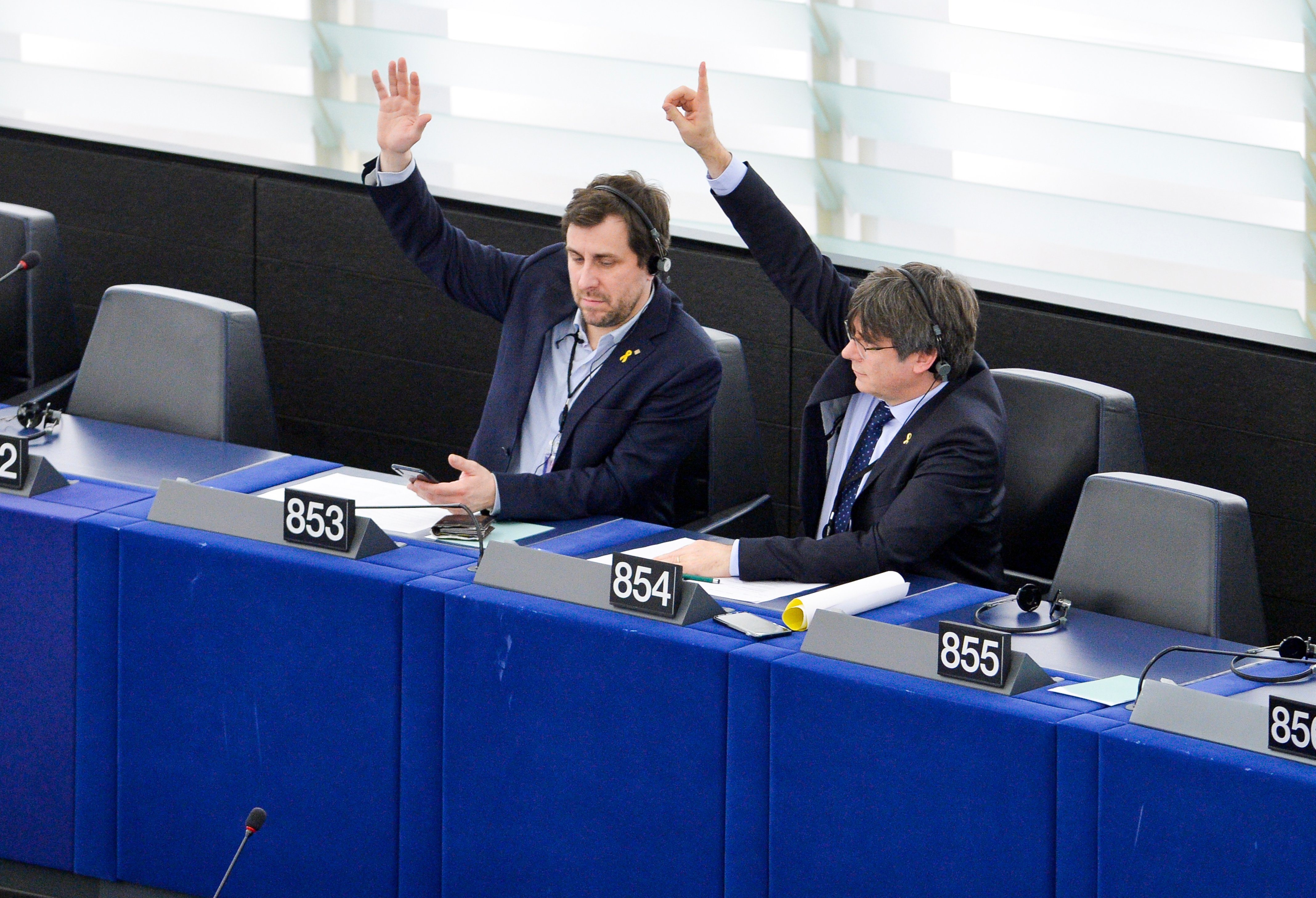Spain's Supreme Court has issued two rulings that dismiss appeals raised by Catalan pro-independence MEPs Carles Puigdemont and Antoni Comín, and, in spite of the EU judicial developments that have occurred in recent months, back the country's Central Electoral Commission in its 2019 insistence that the two Catalan politicians need to swear allegiance to the Spanish constitution in order to take office in the European Parliament.
Today's resolutions have been surpassed by events: they cannot be put into effect, because Puigdemont and Comín have become MEPs - due to the EU court decision in the Oriol Junqueras case - and now only the European chamber itself can decide on the future of its members.
The rulings, by the Supreme Court's administrative disputes chamber, relate to Puigdemont and Comín's appeals against the Spanish electoral body's decisions in June last year, when it told the European Parliament that their seats as elected MEPs would remain vacant until they had sworn allegiance to the Spanish Constitution. They were thus excluded from Spain's list of elected European representatives, and were only able to take their seats in Brussels when the EU Court of Justice ruled in December that they had become MEPs as soon as the election results were announced.
Nevertheless, Spain's highest court has now endorsed the constitutionality and legality of the action of the electoral commission, as "it correctly applied the Spanish electoral law", and "did not discriminate against the appellants or act arbitrarily or in violation of their fundamental rights" and "did not act against them for political reasons. The actions taken do not, therefore, involve any political persecution of Messrs. Puigdemont and Comín," say the Spanish court's rulings.
The Supreme Court explains that "the persistent invocation of European Union law" in the Catalan MEPs' appeal "does not translate into the identification of a single precept that represents a plus in terms of freedom and equality, with respect to the guarantees of these which the Spanish constitutional system offers. They do not demonstrate what they claim about this superior external protection. And we find that in the 1976 [European] Electoral Act, in addition to its reference to the legality of the [Member] States, there is no provision that prevents compliance with the Constitution in the manner required by [the relevant article of Spanish law]".
The court considers it inappropriate to pose - as requested by not only Puigdemont and Comín, but also the public prosecutors, the legal advisors to the Spanish parliament and the electoral commission itself - a preliminary question to the EU Court of Justice as to whether the need for the constitutional pledge is compatible with EU law. Article 224.2 of the Spanish electoral law clearly states the requirement for the constitutional pledge, as well as the inability to take office if it is not met.
The reason for rejecting this proposal for a preliminary question is that both appellants have subsequently been recognized as MEPs by the European Parliament, following the judgment by the European Court of Justice on 19th December 2019 in which a preliminary question from the Supreme Court was answered, relating to the scope of the immunity of fellow elected MEP Oriol Junqueras. Therefore, according to the judges, whatever ruling the EU court would reach if the question were now referred to it, it would have no relevance to the substantive claims of the appellants as it is well known that they have been recognized as members of the European Parliament and as such are holding office.
Today's ruling, then, insists on the constitutionality of the Spanish requirement to abide by the country's constitution, established in its electoral law, and stresses the lack of European precepts and jurisprudence that regard this as incompatible with Union law.
For the judges, "requiring obedience to the Constitution as a condition for access to a position obtained via democratic election by citizens is not something unknown in constitutional law nor can it be reduced to a mere insignificant formality. Although the specific reason for requiring it and the way of fulfilling it vary according to the historical and cultural circumstances, in any case it is a very personal act which in the Spanish legal order does not imply ideological adherence to the principles and values of the Constitution nor to the organization of the power it establishes, but rather, respect for the procedures provided therein, and also for its reform, even in its entirety, as its article 168 allows."
The court recalls in its rulings that Puigdemont and Comín are accused of very serious crimes and asserts that, to avoid the action of justice, they fled from Spain. And the ruling states that in this condition of "fugitives" they presented themselves as candidates in the 2019 European elections, since the Spanish electoral law does not prohibit those who are in their situation from standing in elections. Therefore, the same chamber of the court defended the right of the Catalan politicians to be elected, through a ruling it made on May 5th, 2019, thus leading to the subsequent questions considered by the chamber, which are the substance of the appeal: Puigdemont and Comín's failure to appear on June 17th last year in Madrid, to swear on the constitution, and instead "by legal imperative" sending a notarial document from Belgium to the same effect, which the electoral board did not accept.

